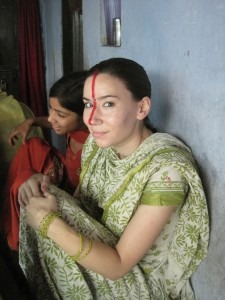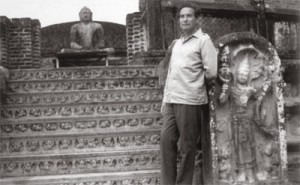
I’ve just come back from several months living in a one-room bungalow/ former wood shed in rural Bihar, India. When you’re living in a place with spotty electricity and no running water surrounded by people who are monolingual in a dialect of Hindi you can only sort of understand, the fact that you happen to know a bunch of other languages can feel a bit isolating and pointless. To avoid these feelings, I spent most of my time trading gossip, learning to tie a sari, and doing my laundry in a bucket, and very little time thinking about literature written in Spanish. Even so, every once in a while I was forced to confront the fact that these two halves of my scholarly endeavor, one in India and one in Latin America, still share space in the same brain. I’m like some sort of linguistically-oriented Dr. Jekyll and Mr. Hyde. This time, the confrontation came as a series of three emails that shook me out of my self-imposed monolingual exile and into a sort of emotional thicket I’d been actively trying to avoid. You see, someone was asking me to do some Spanish-to-English translation.
Nine months prior, knowing I was headed for an extended stint in India and longing to find an intellectual forbear in this foolish course, I had visited the Harry Ransom Center to read Octavio Paz’s correspondence with his Texan translator, Lysander Kemp. Beginning in the middle of the 1960s, the letters coincide with Paz’s residence in India as ambassador for Mexico. Initially my interest was drawn to the typescript drafts of Paz’s poems about India: lines scratched out and re-written, certain margins embellished with the faint traces of his fountain-pen cursive, shapely but surprisingly hard to decode, others clarified with the telltale looping script of an English-medium Indian education standing out in bold blue pen. These latter annotations, I discovered, were apparently made by an embassy official named “Asif Thackery,” a revelation that made me feel lonely all over again. It was as if I were the only person who would read those two names together and realize they were absolutely incongruous in a single person, rather like my languages and me.

The further I read in the Kemp papers, however, the more I was struck by the difficulties the two men faced getting Paz’s work published in translation. Even for such an established author, working on a guaranteed contract with New Directions, the process of bringing out an English version of “Piedra de sol” was arduously slow. This was at the height of Boom-era interest in Latin American literature, and they could still barely manage to publish a poem that was, by that time, twenty years old! Now, that American interests have shifted, translation publishing has splintered and specialized, and reading in general is on the decline, what kind of timeline could be hoped for a would-be translator?

Fast forward to my room in Bihar. I had just received two separate emails about the possibility of publishing selections from a book I done four years ago after winning a prize for young, previously un-published translators. At the time I thought the publication process would be fairly quick and painless compared to the intense months of actually translating a book. Slowly, guided by people much more talented and experienced than myself, I came to see that finding a home for my completed translation would be, by far, the harder part. Here was an author I loved and a project to which I had dedicated so much time and effort up front, and at the end of all that there was nowhere for it to go. Devastated by my own naiveté as much as the vagaries of the market, I retreated from translation and devoted myself to other interests. Then, in 2011, my friend at Cambridge introduced me to a literary magazine run out of their Spanish and Portuguese department: Palabras Errantes, an online forum for publishing contemporary short stories and poetry from all over Latin America. Working with them had the huge advantage that it relieved me of all responsibility for choosing the work or sorting out the behind-the-scenes business of obtaining foreign rights and managing relationships. Oh, and there was a guarantee that they would actually have a home for all my hard work.
For a while not choosing was exciting: I learned about a lot of authors I otherwise might have missed; I stretch for new styles and genres I might have avoided if left to my own devices; I didn’t feel the weight of attachment or disappointment when a project guided by my own preferences was abandoned at the alter, so to speak. But then, just around the time the other two translation emails landed in my inbox, a note Palabras Errantes also reminded me of the pleasure making a choice. Shuffled into a recent call for participants was the name of an author I not only recognized, but really enjoyed. Like Paz, he’s a Mexican who has written a surprising amount about India. Suddenly, after promising myself to emotionally detach and let projects come to me, I was back out on a limb.
So now I’m feeling a lot like Octavio Paz again, except that it’s my husband who proofreads my drafts and not an earnest embassy lackey with a funny name. His letters reminded me that translation troubles can track you down and annoy you no matter how far you try to run away. No, just kidding. They reminded me that you should never give up, that publishing in translation is and always will be slow, but that it can also be exciting and tremendously worth while—a way to unite the linguistic alter egos we might erroneously strain to hold apart.

2 comentarios
It’s amazing to read about the unexpected links between people and places that we would otherwise perceive as completely disparate. Plus, I really love your photo descriptions.
Yeah, the captions are great. And I think we all feel like Dr. Jekyll and Mr. Hyde at times, balancing between languages, cultures, work, live, etc., although it does seem like Bihar to Paz would exacerbate that feeling. By the way, with Palabras Errantes, were you editing?